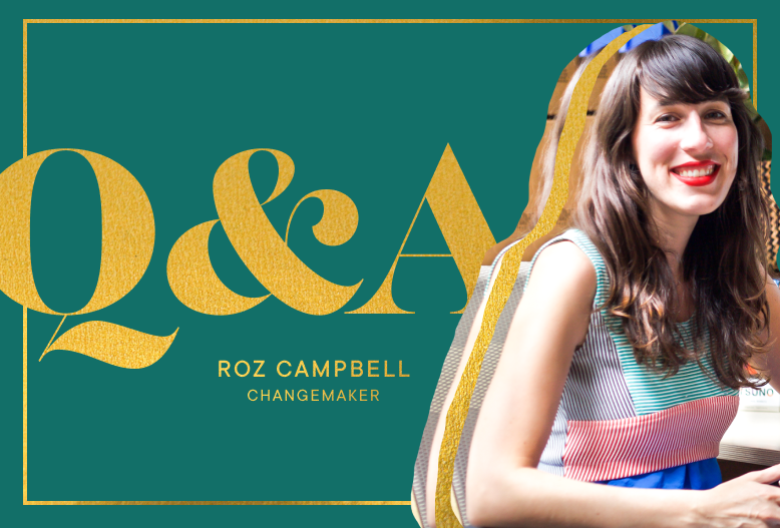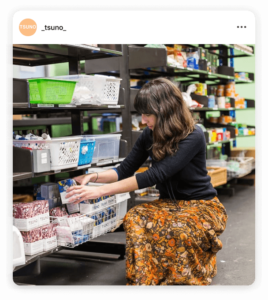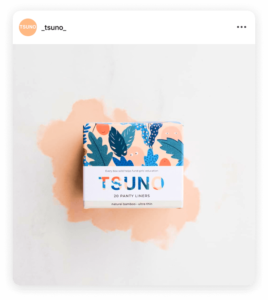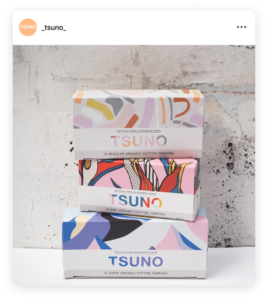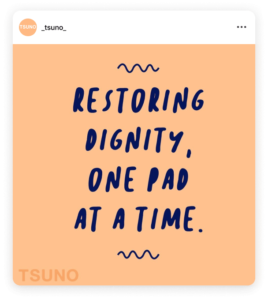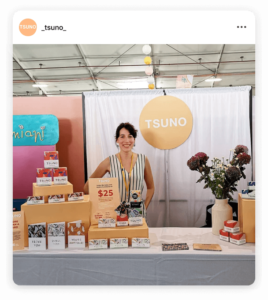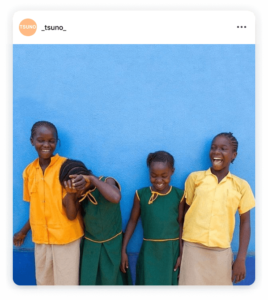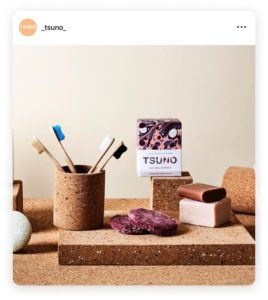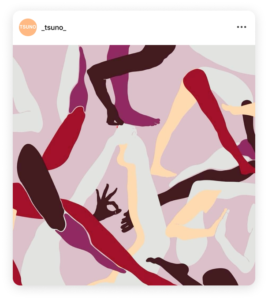If you’ve been wanting to change the way you think about your period – you better do it Tsuno rather than later! Founded by changemaking superwoman Roz Campbell, Tsuno is a social enterprise changing periods for the better by producing disposable, sustainable bamboo fibre sanitary pads and organic cotton tampons. Donating 50% of their profits to charities focused on empowering women through education and menstrual support, Tsuno is truly changing periods for good.
We sat down with the astounding founder to hear her story… And we think it’s pretty bloody amazing! Period.
Tell us your story! How did Tsuno come about?
About seven years ago I had an idea. The idea came flying at me from many angles. I was studying industrial design at uni, and had just been to Europe to exhibit a chair I’d designed. When I was in Europe, I got my period.
It was here I was made aware for the first time of this incredible thing called ‘the menstrual cup’. Of course I bought one. I was so amazed that something like this wasn’t very well known in Australia! I wanted to tell every woman I knew about it. After a little research I learnt that they had actually been invented around the 1930’s. About the same time as the first tampon came to be.
“All women have such different needs. Personal preference, religion and health amongst a host of other influences come into it. There should be more options for us.”
After that I started doing more and more research into the feminine hygiene market. I used my cup. Although it sounded amazing, for me it actually didn’t work as well as I’d hoped. I was still using pads and tampons. But I thought I could design something better, or even, something completely different. In my research I realised that women are all different. All women have such different needs. Personal preference, religion and health amongst a host of other influences come into it. There should be more options for us.
What inspired you to create sustainable pads and tampons?
I was shocked to learn about the chemicals that are used in the process of manufacturing many pads and tampons on the market. The plastic that’s used that after a just a few hours use, which ends up in landfill for hundreds if not thousands of years. Pesticides that are sprayed all over the cotton to help it grow without insects making a dinner of it. The chlorine used to bleach them.
Around the same time, I heard about an Australian based charity providing education scholarships to women and girls in Sierra Leone, called One Girl.
After sending their first bunch of girls to school, they realised many were missing up to a week of school every month because of THEIR PERIODS. They would fall behind at school, struggle in exams and eventually drop out. I was gobsmacked – I’d honestly never given it any thought what people do when they can’t afford or don’t have access to sanitary products. I definitely didn’t think something so easy for me could affect someone else’s ability to stay in school.
“I’d honestly never given it any thought what people do when they can’t afford or don’t have access to sanitary products. I definitely didn’t think something so easy for me could affect someone else’s ability to stay in school.”
In 2013 I decided to take part in One Girl’s yearly charity fundraising challenge, and set myself the challenge of using the methods women used when they didn’t have access to affordable sanitary products. I used rags, newspaper, kitchen sponges and leaves. In fact I was going to use bark – yes bark from a tree – but when I went to the tree to pull some off I actually couldn’t bring myself to do it. I really felt something strong. For a woman to be in the position where bark is her best option, that’s definitely not a good position.
Coming full circle, I felt compelled to try and do something to help. Life feels better for me when I help, and Tsuno is how I’ve decided to do so.
How did you make your vision a reality?
I sourced a product from a manufacturer working with sustainable fibres. They make bamboo and corn fibre disposable sanitary pads! Bamboo is an amazing material. It grows so quickly, and the harvesting process doesn’t erode the soil. It’s cut like a grass, and keeps growing, rather than being ripped out by the roots like most plants. It’s naturally pest resistant, meaning no chemical fertilisers or pesticides are needed to grow it. The structure of the fibre is quite hollow, so it has lots of room for absorbing moisture, which is perfect for pads, drawing the moisture away from your body.
My manufacturers and I have worked together on making a version of our pads that no longer requires a polyethylene under layer (the leak proof part!) and we have replaced this with a biodegradable corn starch based film. They’re individually wrapped in a biodegradable plastic sleeve to keep them clean, a recyclable cardboard box – to reduce the plastic sitting in landfill forever – and are free from chlorine and dioxin bleach. While not 100% biodegradable yet (they contain a super absorbent inner layer which makes them work very well), but we are working to find a suitable, renewable alternative.
How did you get Tsuno off the ground?
I needed just over $40 000 to buy my first order from the manufacturers. I didn’t have $40 000. No bank would take me seriously when I told them what I wanted the money for, so I decided to crowd fund the idea. In May 2014, about 1200 women believed in my idea. They invested $30 each to pre-order some of these pads until I reached the amount I needed to buy my first shipping container. In October 2014 they arrived… now, I’ve just had my fifth shipment delivered last month. It’s working!
In November 2016, after huge demand from my customers, I launched a second crowd funding campaign to introduce 100% certified organic cotton tampons to the Tsuno range. It took $45 000 in pre-sales, and thankfully we made it!
What’s Tsuno’s mission?
Sell lots of pads and tampons! Instagram has helped us to reach people who want and need them. More seriously though, our mission is to break down the period taboo. As well as sell products, and direct funds to charities helping those who need it. We have some new products in the pipeline and some new customers who have recently joined us – so I look forward to nurturing those relationships and seeing the business grow sustainably.
How did Instagram help you grow your brand?
Because I have bootstrapped Tsuno to get it started, I really relied on Instagram, and still do, to grow my community of customers. I have also been able to connect with artists, menstrual equality advocates, health professionals, like minded business owners, charities, retailers, you name it – all because of the way Instagram makes it so easy to connect, communicate and relate to people all around the world.
“I’ve been able to connect with artists, menstrual equality advocates, health professionals, like minded business owners, charities, retailers, you name it – all because of the way Instagram makes it so easy to connect, communicate and relate to people all around the world.”
What’s the most important thing Tsuno has accomplished?
Tsuno donates 50% of net profits from the sale of our pads to charities helping to empower women living in poverty – both locally and abroad. It took a while for us to become profitable, but so far we’ve been able to donate approximately $65,000 worth of funds and product to a number of admirable charities. Most notably One Girl – who provide education scholarships and menstrual health support to girls in Sierra Leone and Uganda.
What’s the hardest thing about running a start-up?
I’ve found the most difficult thing as a solo woman is keeping on top of all the different tasks to keep the business functioning. From graphic design, sales and marketing to warehouse operations, logistics and accounting. I am constantly wearing so many hats, and focusing on one job from start to finish can be a huge challenge.
How did you build your strong brand identity?
The brand has come from within me, so up until recently I had never done a ‘brand guide’. It was all just in my head and heart. Originally the branding was a reaction to what I saw on the shelves in stores. I wanted something fun, colourful and beautiful – not too medical or overtly ‘girly’. I wanted to encourage people to display their sanitary products on the shelf, carry them with pride. As opposed to hiding them away with shame or embarrassment.
What’s your advice for people struggling to find their niche?
My advice would be to take a step back, strip yourself down to maybe the top 5 things you LOVE, and ask your closest friends to describe you in five words. See how that sits and go from there.
How important is authenticity on Instagram?
I think Instagram is a complicated and beautiful beast. There’s the comparison to other people’s ‘highlights’ which if not managed with the right intent and frame of mind can really be negative. But then there’s many beautiful moments of connection. I often enjoy it most when I am being authentic myself, when I not only share the highs but also the lows – and I definitely respond way more to people’s accounts that show that authentic side of the person running them.
It can be tricky with running a brand. I can get confused between ‘brand’ and ‘Roz’, but I am also lucky I have the ability to be both because of the precedents I have set with building Tsuno.
How do you come up with Tsuno’s unique visual designs?
I’ve had many, many contributors to the Tsuno aesthetic over the years. I do a bit, and I’ve had graphic designer friends help with the branding. On an ever-changing basis, I invite artists I love to share half our packaging space to display their signature styles. It’s one of my favourite things getting their visual ideas back from our first discussions!
What challenges have you faced as women in the creative industries?
I’m not sure if anything I’ve experienced that has challenged me applies specifically to me as a woman. I have been lucky to find myself in an area that is very women centric though, and VERY supportive. Maybe that’s the answer. Women make a habit of supporting each other a lot, which I have benefited from and reciprocate a lot.
“I have been lucky to find myself in an area that is very women centric and very supportive. Women make a habit of supporting each other a lot, which I have benefited from and reciprocate a lot.”
What’s your advice for other women wanting to start their own business or make a difference with Instagram?
Do it! You’re going to find many of your people on Instagram. Be honest, use it as a platform to connect, to educate and to support each other.
